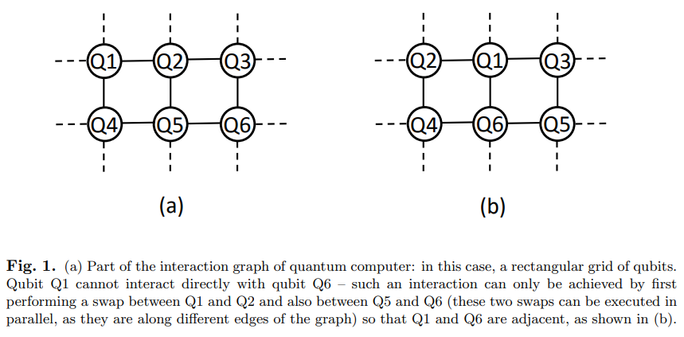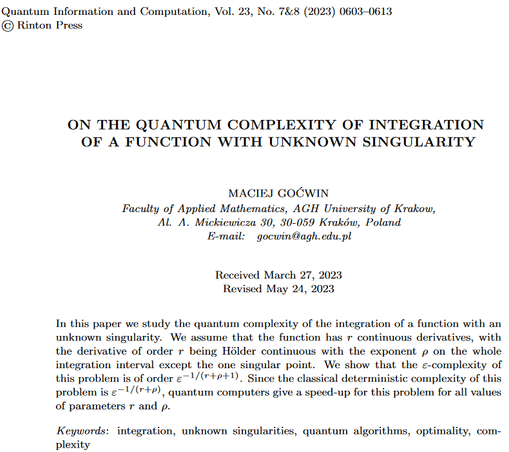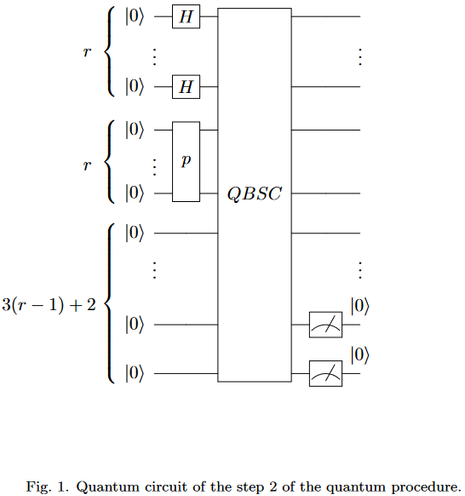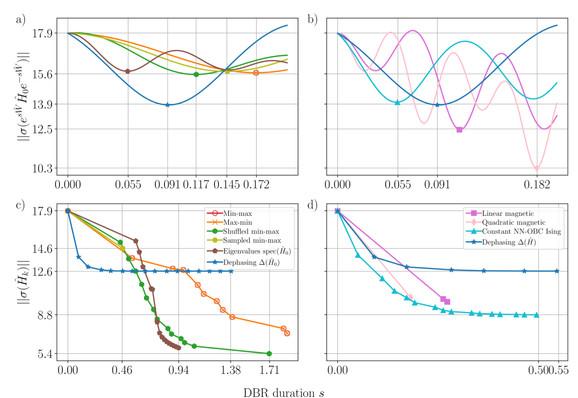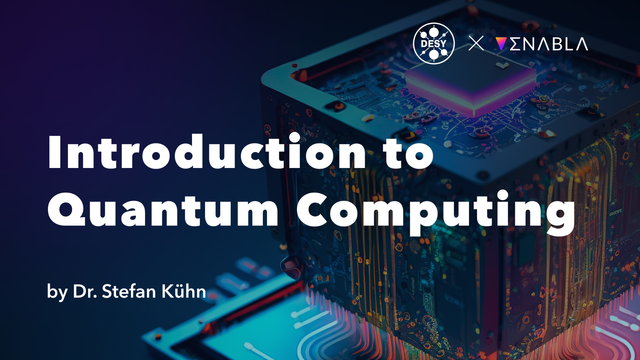✍️On the depth overhead #incurred when running #quantumalgorithms on near-term quantum computers with limited #qubit connectivity #by Steven Herbert
#quantumalgorithms
Another day another paper by one of my (now former) colleague, myself and a few others on the feasibility of #quantumcomputing and #quantumalgorithms
If you are interested in such things, please check it out. I am also very keen to learn about your possible experiences on applying quantum computing. We are now researching the #cybersecurity of quantum computing in a couple of different projects.
https://link.springer.com/chapter/10.1007/978-3-031-78392-0_10
✍️ On the #quantumcomplexity of integration of a function with #unknown singularity #by Maciej Gocwin
✍️Efficient #quantumalgorithms to find #substructures on finite algebras #by J.M. Hernandez Caceres, I.F. Rua, and Elias F. Combarro
Do not hesitate to contact us if you have any questions! We look forward to a smart audience for the training and an exciting online course.
#ProfessionalTraining
#QuantumComputing
#QuantumAlgorithms
#QuantumPhysics
#QuantumProgramming
#FOKUSakademie
Posted today: strategies for how to go about optimising double-bracket #quantumAlgorithms
https://scirate.com/arxiv/2408.07431
We compare with cases inspired by Brockett's #doubleBracketFlow which have rigorous global convergence guarantees and found that departing from them and at every step optimising the involved generators gives faster diagonalization.
This motivates our upcoming work on training our double-bracket circuits on single-shot samples: today we posted that 1) within the class of #doubleBracket #quantum algorithms it's worthwhile to variationally train the parametrisations at every step, last week we posted that 2) warm-starts from #VQE facilitate very high ground state preparation fidelity and so 3) training on shot-noise limited data will give an idea how to use our approach on future large-scale quantum hardware.
Get to know Barbara Kraus, our newly appointed Professor of #QuantumAlgorithms and Applications, in our "NewIn" series. She is looking for computable rules for the behavior of #quantumsystems to enable reliable new applications: https://go.tum.de/484409
We have a TT Assistant Professor position in Quantum Algorithms for Chem & Life Science open at UCPH. Please apply! Encourage your friends to apply. Extended deadline August 20.
I know there are lots of quantum folks on Mastodon (because I enjoy reading all your posts 😀 ) - we'd really appreciate boosts to try to get this out to a broader quantum audience.
https://candidate.hr-manager.net/ApplicationInit.aspx/?cid=1307&departmentId=18971&ProjectId=159461&MediaId=5&SkipAdvertisement=false
#QuantumComputing #Quantum #UCPH #Copenhagen #TenureTrack #NQCP #QuantumForLife #QuantumAlgorithms
Quantum computing is set to revolutionize industries, and it is never too soon to dive into this rapidly advancing field😉
Explore the core concepts in the new introductory DESY lecture and engage in open discussions at https://enabla.com/pub/1069/about 🔗
Learn about qubits, quantum gates, the role of entanglement in quantum algorithms, the fundamentals of complexity theory, a few hybrid quantum-classical algorithms, and the noisy intermediate-sized quantum devices🧑💻
All #Enabla lectures are #free and #OpenAccess. Support us by liking, reposting, following, and engaging in discussions on Enabla. Your actions help us spread knowledge. Thank you!🙏 @DESY @DESYnews
#QuantumComputing #Qubits #Entanglement #QuantumAlgorithms #ComplexityTheory #NISQ
#Combinatorialoptimization - a field of research addressing problems that feature strongly in a wealth of practical and industrial contexts - has been identified as one of the core potential fields of applicability of near-term #quantumcomputers. It is still unclear, however, to what extent variational #quantumalgorithms can actually outperform classical algorithms for this type of problems.
@MarisOzols I don't know anything about #QuantumAlgorithms, so the image looks like a medieval music sheet to my eyes
🙃
#QuantumAlgorithms can be beautiful to look at! Here is a #quantum circuit on 68 qubits that prepares the ground state of a certain Hamiltonian that corresponds to a quantum error correcting code.
This can be used to simulate the behavior of certain exotic particles called non-Abelian anyons.
Read this paper for more details:
https://arxiv.org/abs/2211.09802
In Episode 4, we talked to Prof. Román Orús about #TensorNetworks, #QuantumAlgorithms and #QuantumInspired techniques.
We heard about how algorithms that originated in many-body physics could be put to use in solving real-world optimisation problems and how #MultiverseQC is applying these techniques with real clients in areas such as finance.
Take a listen to the episode if you'd like to know more - available on all good podcasting platforms!
#QuantumInformation #Multiverse #QuantumComputing #DMRG #Tensors #ManyBodyPhysics #Quantum #insideQuantum #DIPC #QuantumTechnology
So let's see who's around already :) any #QuantumInformation people? Maybe working on #nisq algorithms? Or other #QuantumAlgorithms?
Graphical platforms to learn about quantum algorithms using quantum gates: Quantum Experience by IBM Bluemix and Quantum Inspire by QuTech.
Quantum Experience link: https://quantumexperience.ng.bluemix.net/qx
Quantum Inspire link: https://www.quantum-inspire.com/
On both you can program using cQASM (quantum assembly language).
#quantumalgorithms #quantumgates #quantumexperience #quantuminspire #cQASM #QASM
